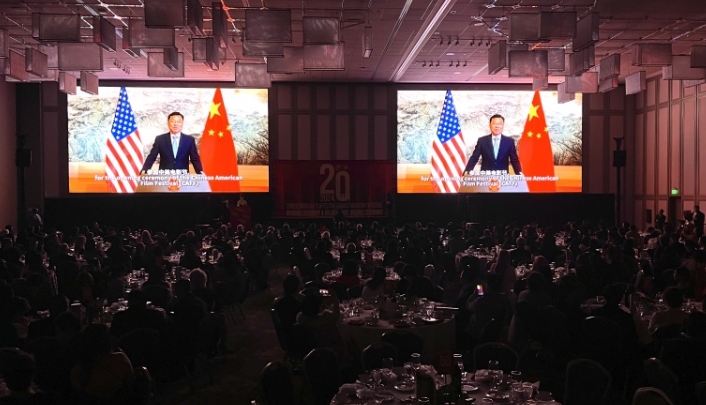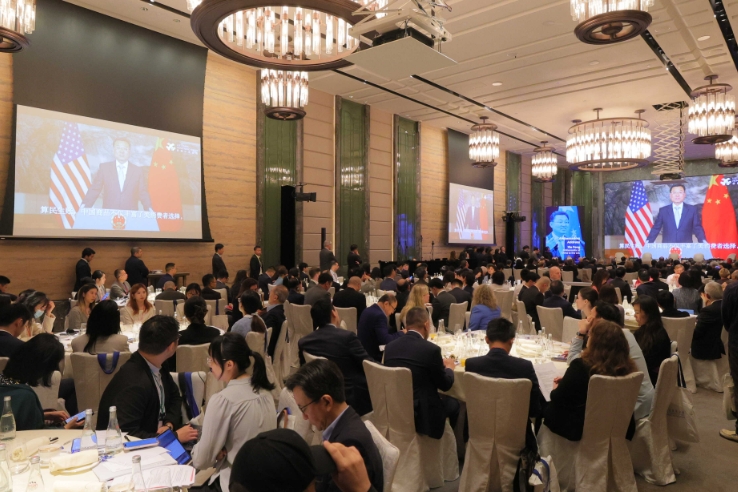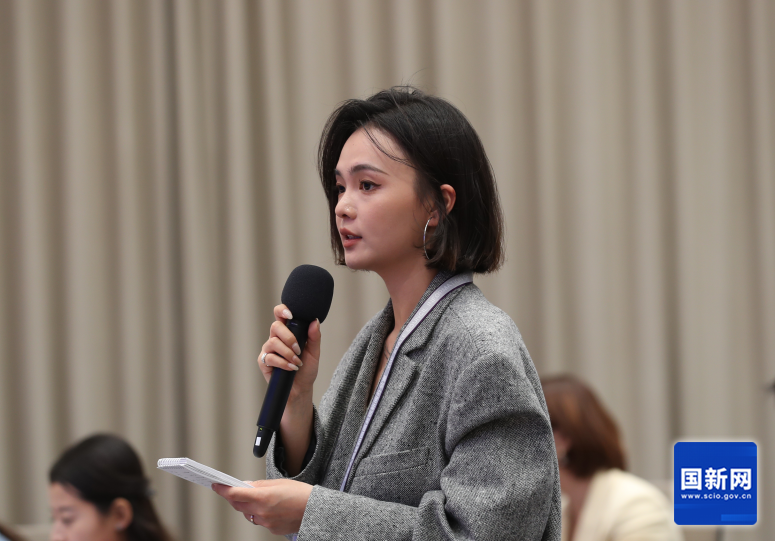
刘晓明大使接受英国联合国协会会刊《新世界》(NEW WORLD)采访:中国与联合国
2013年4月,英国联合国协会会刊《新世界》登刊该刊记者对刘晓明大使采访,全文如下:
记者:中方对第67届联大的优先关切是什么?
刘大使:中方对第67届联大有三大优先关切。
一是坚持原则。联大在处理热点问题时,应继续坚持《联合国宪章》的宗旨和原则,尊重各国主权、独立和领土完整,倡导和平解决争端。这有助于加强联合国在国际事务中的领导和核心作用。在涉及国际和平与安全问题上,联大应根据《联合国宪章》的分工,与安理会加强协调与合作。
二是发展问题。要切实推进联合国可持续发展大会后续进程,同时必须坚持“共同但有区别责任”原则。中方期待第67届联大尽早启动可持续发展目标制定有关讨论进程,建立政府间可持续发展高级别政治论坛,加强联合国在促进可持续发展方面的核心领导作用,充分照顾发展中国家的关切,为可持续发展事业注入新的动力。本届联大应继续推动国际社会落实千年发展目标,为实现千年发展目标提供机制保障,同时考虑制定2015年后的发展议程。
三是维护团结。联合国有193个会员国,各国在具体问题上的利益关切不尽相同。联大应以平衡、公正方式开展工作,推动会员国相互尊重,充分协商,争取以协商一致方式达成共识,推动有关问题得到妥善解决。应避免采取强行推动表决等引发对立和分裂、损害会员国团结的做法。
记者:你认为哪一个联合国机构或倡议值得投入更多经费?
刘大使:作为世界上最具代表性和权威性的政府间国际组织,联合国对各类全球性问题的解决承担着重要责任,发挥着不可替代的作用。冷战结束后,特别是进入新世纪以来,和平与发展成为时代主题,世界多极化和经济全球化趋势不断发展,各种全球性挑战和威胁日益增多,国际社会普遍期待联合国在维护世界和平、促进共同发展、加强国际合作方面发挥更大作用。联合国在发挥自身重要作用的同时,应科学合理安排支出,联合国各职能部门应力争少花钱、多办事。
记者:中国在联合国的最大成就是什么?
刘大使:联合国成立至今,在预防和减少冲突及战争、推动经济和社会发展、促进国际立法和国际规则制定等方面的作用突出,成效显著。作为联合国的创始会员国之一和安理会常任理事国,中国为之做出并将继续做出自己的努力。中国一贯坚定支持联合国在事关世界和平与发展及全球性挑战问题中发挥核心领导作用,重视维护国际公平正义和联合国权威。中国将一如既往加强同联合国的合作,致力于同各国一道,推进实现世界和平发展、合作共赢、公平正义。
记者:你是否赞同“安理会改革是改进联合国工作唯一最为重要的改革”这种说法,为什么?
刘大使:联合国包括其安理会需要与时俱进,进行必要的、合理的改革,以提高权威和效率,增强应对新形势和新挑战的能力。安理会改革是联合国改革中的一个重要组成部分,其他部分的改革对联合国发挥其应有作用也很重要。
中国支持安理会通过必要、合理的改革增强权威和效率,更好地履行《联合国宪章》赋予的维护国际和平与安全的职责。安理会改革应优先增加发展中国家、特别是非洲国家在安理会的代表性,这符合占联合国会员国大多数的中小国家的根本利益。安理会改革十分复杂,应继续进行民主、耐心协商,兼顾各方利益和关切,寻求“一揽子”改革方案,并达成最广泛一致。中国愿同各国共同努力,推动安理会改革朝着有利于维护联合国整体利益和会员国团结的方向发展。
记者:联合国是否本应该在防止金融危机方面做得更多,是否应在全球经济治理中发挥更大作用?
刘大使:国际金融危机给世界带来巨大冲击,需要各国深刻反省并从国际层面加以应对。目前,国际金融体系改革虽取得一定进展,但深层次问题并未解决。中方支持联合国在国际经济事务中发挥更大作用,包括:加强与布雷顿森林体系等多边金融机构及二十国集团的对话与协调,推动深化国际金融体系改革,进一步提高发展中国家发言权和代表性,建立公平、公正、包容、有序的国际货币体系;加强对国际金融机构和“影子银行”的监管,使金融体系更好地服务和促进实体经济发展;推动国际金融机构加强发展和减贫职能。
记者:联合国怎样才能更有效阻止大屠杀?
刘大使:中国对平民生命、财产安全在武装冲突中受到威胁、遭到损失深表关切,敦促各方认真遵守国际法和联合国安理会有关决议,在武装冲突中充分保护平民,任何大规模屠杀平民的行为都应被追究责任。根据《联合国宪章》和国际人道法,保护平民的责任首先在于当事国政府。如果当事国政府无法履行其保护平民的责任,联合国可应当事国要求或在当事国同意的条件下提供帮助,但应坚持公正、客观和中立原则,并充分尊重当事国主权与领土完整,避免介入当地政治纷争或影响和平进程,从而导致更大的生命、财产损失。
记者:你如何评价千年发展目标的落实情况?如何展望2015年后的国际发展议程?
刘大使:千年发展目标是指导国际发展合作的重要纲领。多年来,国际社会积极推动落实千年发展目标,取得一些积极进展。但从全球来看,千年发展目标的落实情况很不平衡。发展中国家如期实现千年发展目标困难重重。
未来三年,国际发展合作的重点仍应是履行世界各国领导人的庄严承诺,全面落实千年发展目标,保证发展资源,集中力量帮助非洲发展和脱贫,重点加大对最不发达国家扶持力度。有关2015年后发展议程的讨论不应分散和削弱国际社会如期实现千年发展目标的努力。制定2015年后的发展议程,涉及全球范围的长期战略规划,需要全面评估国际发展合作现状,特别是全球落实千年发展目标进展,并在总结各方发展经验和教训的基础上慎重推进。这个进程,应由成员国发挥主导作用,在联合国框架下进行。
2015年后国际发展议程应体现几个基本原则:应继续以消除贫困为核心,坚持“共同但有区别的责任”原则,统筹考虑各国不同国情与发展阶段,尊重各国发展道路,应重视加强全球发展伙伴关系,建立完善的落实机制,加强发展筹资,促进投资贸易自由化和便利化,继续推进南北合作并加强对发展中国家的官方发展援助及技术支持,加强南南合作。
记者:再过几年金砖国家的GDP总量就可能超过美国或欧盟。而根据一些人的测算,现在实际上已经超过了。那么金砖国家是否准备成为官方发展援助和联合国系统最大捐资方呢?
刘大使:发展融资不足问题一直是国际发展领域面临的主要挑战,特别是在国际金融危机给低收入国家造成严重冲击的背景下,这一问题显得更加突出。国际社会,特别是发达国家应积极兑现在资金援助、技术转让和能力建设等方面对发展中国家的承诺,不应以种种借口推卸其应尽的国际责任。
联合国会费及联合国系统其他捐资应严格遵循支持能力原则,这是联合国成立之初就由联大议事规则明确规定的基本原则。衡量一个国家的支付能力,既要看其国民总收入,更要看其人均收入水平,前者是基础,后者才是决定性因素。
金砖国家近些年发展势头良好,经济总量增长较快,但都还是发展中国家,其发展水平特别是人均水平与发达国家相去甚远。中国目前经济总量只相当于美国的61%,人均GDP则更低,只相当于美国的12%。一些英国学者和研究机构也曾指出,美国总体生活水平分别比巴西、中国、印度高出4倍、6倍和15倍。即使到2022年,金砖国家经济总量预计也只相当于美、日、德、英四国总量的75%,人均差距则更大。发展中国家承担的国际责任应与其发展阶段和实际能力相适应。金砖国家对发展中国家的援助是南南合作框架内的互助性合作,只能作为南北合作的补充,而不是替代。
中国是负责任的发展中大国,始终不断地增加对非洲等其他发展中国家的各类援助。不久前,联合国通过了2013-2015年成员国会费比例调整方案,中国的会费比例由此前的3.2%提高至5.15%,其他金砖国家的分摊份额也都有较大幅度的增长。
记者:金砖国家作为一个“集团”在联合国中的前景怎样?
刘大使:近一、二十年来,国际格局发生了重大变化,发展中国家总体实力及对国际事务的贡献率都有很大提升,但其在国际机构中的代表性和发言权并未得到充分体现。金砖国家是发展中国家的重要组成部分。金砖国家之间加强团结合作对促进世界和平与发展、推动南北对话和维护发展中国家的正当权益具有重要意义。金砖国家的发展属性、历史背景和时代任务决定了其应该也能够在国际事务中加强协作,共同推动建设持久和平、共同繁荣的和谐世界。
记者:最后,问一个轻松的问题。如果联合国总部设在中国,联合国是不是会更好?
刘大使:这可不是一个轻松的问题,但是一个值得认真思考的问题。目前,联合国机构总部只有两家设在发展中国家。如果今后随着形势发展,有更多的联合国机构总部设在发展中国家,那将不仅受到广大发展中国家的欢迎,而且将有利于发展中国家国家更加积极地参与联合国事务。
* * * *
《New World》是英国联合国协会会刊,按季度在全球发行,在100多个国家有2万多位个人或组织机构读者,其中包括有关国家主要媒体、发展中国家400多个非政府组织和学术机构、英国和欧洲国家决策者、驻伦敦和纽约等地外交使团等。该刊于上季度开始陆续刊登金砖国家驻英使节专访,介绍金砖各国对涉联合国重要问题的看法。
Ambassador Liu Xiaoming Interview with New World: China and the United Nations
New World: What are your top UN priorities for the 67th General Assembly Session?
Ambassador Liu: China has three top priorities for the 67th Session of the General Assembly.
First, upholding principles. In dealing with global hot spot issues, the UN General Assembly should continue to uphold the purposes and principles of the UN Charter; that means respect for sovereignty, the independence and territorial integrity of all countries. Overall there must be an insistence on peaceful settlement of disputes. If these points are adhered to then this will strengthen the leadership and central role of the UN in international affairs. In addition, on issues concerning global peace and security, the General Assembly should increase coordination and cooperation with the Security Council; again this should be based on the mandate set forth in the UN Charter.
Second, in the 67th Session there should be a stress on development issues. Determined and detailed actions are needed to advance the follow-up process to the UN Conference on Sustainable Development; this should be carried out while observing the principle of common but differentiated responsibilities. China hopes that the 67th General Assembly will launch the process to develop a set of Sustainable Development Goals (SDG). This means establishing an intergovernmental high-level political forum on sustainable development and strengthening the central role of the UN in promoting sustainable development. We also hope that the 67th Session of the General Assembly will take into full consideration the concerns of developing nations and inject fresh dynamism into the cause of sustainable development.
This Session of the General Assembly should continue to promote the international community’s attainment of Millenium Development Goals, or MDGs. This should include the provision of institutional guarantees for such efforts and at the same time consider formulating a development agenda beyond 2015.
Third, in the 67th Session there should be a maintenance of solidarity. The UN has 193 member states. They each have different interests and concerns. The General Assembly should conduct its work in a balanced and fair manner, advocate mutual respect and full consultation among member states, resolve issues through consensus and work for appropriate solutions of related issues. In its working practice the General Assembly should avoid actions such as forcing votes that may cause division or confrontation and undermine solidarity among member states.
New World: In your view, is there one UN body or initiative that deserves more funding?
Ambassador Liu: The UN is the world’s most representative and authoritative intergovernmental international organization. As such the United Nations has critical responsibilities and plays an irreplaceable role in resolving various global issues. Since the end of the ‘Cold War’, especially in this new century, peace and development have become the hallmark of our times. Multi-polarity and economic globalisation have gained momentum. Global challenges and threats are on the rise. The entire international community expects the UN to play a bigger role in safeguarding world peace, promoting common development and strengthening international cooperation. While playing its role, the UN should spend efficiently. As a guiding principle UN bodies should work to achieve more with less.
New World: What has been your country’s greatest achievement at the UN?
Ambassador Liu: Since its foundation the UN has played a prominent role and made remarkable achievements in preventing and reducing conflict and war, promoting economic and social development, and formulating international laws and rules. As one of the founding members of the UN and a permanent member of its Security Council, China has made and will continue to make its own efforts in this regard. Given its position and responsibility China firmly supports the UN’s central role in meeting global challenges and advancing world peace and development. China attaches great importance to upholding international justice and the authority of the UN. China will, as always, step up cooperation with the UN and remain committed to working with all other countries for peace, development, win-win cooperation, equality and justice around the world.
New World: “Reform the Security Council is the single most important reform in terms of improving the UN’s performance” – do you agree or disagree, and why?
Ambassador Liu: The UN, including its Security Council, needs to keep pace with the times and carry out some necessary and reasonable reforms. This will help enhance its authority, raise its efficiency and better prepare it for new situations and fresh challenges. The Security Council reform is an important part of the UN reform. Reform of other agencies is also important for the UN to be able to play its full and proper role in world affairs.
China supports these necessary and reasonable reforms of the United Nations which are aimed to enhance the authority and efficiency of the UN. Such reforms will enable the UN to better fulfill its mandate of safeguarding world peace and security as provided in the UN Charter.
China believes that in reforming the Security Council, priority should be given to increasing the representation of developing countries in the Security Council, in particular African countries. This serves the fundamental interests of small and medium countries that make a majority of the UN membership. The Security Council reform is highly complex. We should continue with democratic and patient consultations, take into consideration the interest and concerns of all parties, seek a package solution and reach the broadest possible consensus.
China stands ready to work with all other countries to advance the Security Council reform in a direction that helps maintain the overall interests of the UN and solidarity among UN member states.
New World: Could the UN have done more to prevent the financial crisis should it play a bigger role in global economic governance?
Ambassador Liu: The international financial crisis has had an immense impact on the world. All countries need to reflect on it, and tackle it at a global level. At present, some progress has been made in reforming the international financial system. Yet some underlying problems remain unresolved. China supports the United Nations in playing a bigger role in global economic affairs. These include: strengthen dialogue and coordination with the Bretton Woods system and other multilateral financial institutions as well as the G20; deepen the reform of the international financial system to increase the say and representation of developing countries and to establish a fair, equitable, inclusive and orderly international monetary system; toughen regulation on international financial institutions and shadow banking systems so that the financial sector will better serve the growth of the real economy; and strengthen the role of international financial institutions in development and poverty reduction.
New World: How can the UN become more effective in preventing mass atrocities?
Ambassador Liu: China places is deeply concerned about situations where life and property of civilians are threatened and lost in armed conflicts. In these circumstances China urges all parties to earnestly observe international law and related resolutions of the UN Security Council; the aim is to always fully protect civilians in armed conflicts. All atrocities against civilians should be treated with the greatest possible levels of concern and punished. According to the UN Charter and international humanitarian law, the government directly concerned bears the primary responsibility to protect civilians. In cases where the government directly involved fails to meet their responsibilities, the United Nations may come to help; but this can only happen at the request or with the consent of the relevant government. In providing such help, the UN should uphold the principle of equity, impartiality and neutrality and fully respect the sovereignty and territorial integrity of the country concerned. The UN should also refrain from involvement in local political strife, or hindering a peace process, which will cause greater loss of life and property.
New World: How do you see the implementation of the Millennium Development Goals? How do you foresee the development agenda in 2015?
Ambassador Liu: Millennium Development Goals, or MDG’s, are an important guideline for international development cooperation. Over the years the international community has made conscientious efforts to implement the MDGs and achieved some progress. Yet the implementation of MDGs around the world has been unbalanced. Developing countries face enormous difficulties in attaining MDGs as scheduled.
In the coming three years international development cooperation should continue to focus on delivering the commitments of leaders of all countries; this means comprehensively implementing the MDGs, ensuring development resources, pooling together resources to help development and poverty reduction in Africa and provide greater support for least developed countries.
Discussions on development agenda beyond 2015 should not divert or weaken international efforts to meet MDGs as scheduled. The formulation of international development agenda beyond 2015 concerns long-term strategic rules at global level. It will require a thorough stocktaking of the current state of international development cooperation, especially the progress in implementing MDGs. It needs to proceed in a careful way after drawing on the experience and learning lessons from all parties. The United Nations should play a leading role in this process. It should move within the framework of the UN.
The international development agenda beyond 2015 should reflect the following principles: it should continue to concentrate on poverty eradication; uphold the principle of “common but differentiated responsibilities”; take into account realities and development stages of different countries; respect development paths of all countries; strengthen global development partnerships; improve implementation mechanisms; make greater efforts in development financing; promote trade and investment liberalization and facilitation; push forward North-South co-operation; scale up Official Development Assistance (ODA) and technical support for developing countries and strengthen South-South cooperation.
New World: In just a few years’ time, the BRICS are predicted to have a larger share of global GDP than the US or EU. By some calculations, they already have. Should the bloc prepare to become the biggest contributor to Official Development Assistance and the UN system?
Ambassador: Inadequate financing has been a main challenge for the cause of international development. This challenge has been put in sharp relief as the international financial crisis dealt a heavy blow to low-income countries. The international community, in particular developed countries, should honour their commitments to developing countries on financial support, technology transfer and capacity building, rather than shirk their international responsibilities.
Membership contributions and other financial contributions to the UN system should be strictly based on “capacity to pay”. This is a basic principle specified in the Rules of Procedure of the General Assembly when the United Nations was founded. To measure a country’s capacity to pay, we need to look at both gross national income and per capita income. The former is the foundation. The latter is the deciding factor.
BRICS countries have showed a sound momentum of growth in recent years. Their total economic sizes are growing fast. Yet all of them remain developing countries. Their development level, particularly in per capita term, is way behind that of developed countries.
The current size of the Chinese economy is only 61% of the United States. Our per capita GDP is even less at only 12% of the US level. Some British scholars and research institutions have pointed out living standards in the US are respectively four, six and fifteen times of Brazil, China and India. Even by 2022, the economic aggregate of BRICS countries is estimated to be only 75% of the combined economies of the US, Japan, Germany and UK. The gap in per capita term will be even more noticeable.
Developing countries should bear international responsibilities in proportion to their development stages and real capacity. BRICS countries’ assistance to developing countries is mutual help within the framework of South-South cooperation. It can only supplement North-South cooperation, not replace it.
China is a responsible big developing country. We have kept increasing assistance of various kinds to Africa and other developing countries. Not long ago, the United Nations approved the 2013-2015 Assessment Scales Used to Determine Member State Contributions to Regular Budget. China’s share of contributions has risen from 3.2% to 5.15%. Shares of other BRICS countries all increased by a large margin.
New World: What is the future of the BRICS countries as a grouping within the UN?
Ambassador Liu: In the recent decades unprecedented changes have taken place in the international landscape. The overall strength of developing countries and their participation in international affairs have greatly increased. But their representation and say in international institutions have not been advanced to reflect their increased role in global affairs. BRICS countries are important members of developing world. Stronger solidarity and cooperation among BRICS countries is of great significance to promoting world peace and development, advancing North-South dialogue and maintaining legitimate rights and interests of developing countries. The nature, historical background and mission of BRICS determine that they should and can increase coordination in international affairs and work together to build a harmonious world of lasting peace and common prosperity.
New World: And finally, on a lighter note, would the UN be better off if its headquarters were in China?
Ambassador: This is a good question and certainly not a light one! It is a question that merits careful thinking. At present, only two UN agencies are headquartered in developing countries. Looking into the future, if as developing countries grow to have greater influence, more UN agencies may have their head offices in developing countries, it will be welcomed by developing countries and, in turn, prompt developing countries to take a more active part in international affairs.
* * * *
New World is UN Association-UK's flagship magazine published quarterly in print and online, with a specialist readership of approximately 20,000 individuals and organisations in 100 countries.
Its readers include prestigious national media, more than 400 NGOs and academic institutions in developing countries, British and European decision makers as well as diplomatic missions in London and New York.
Since its last issue, the New World magazine has been running a series of exclusive interviews with ambassadors from BRICS countries to the UK. These interviews are an authority on the views and positions of BRICS countries on important issues related to the United Nations.
 驻英使馆
驻英使馆
 2013-05-10
2013-05-10
 驻英使馆
驻英使馆
 410次
410次


 点赞(0)
点赞(0)

 收藏
收藏

 收藏资讯
收藏资讯

 收藏资讯
收藏资讯

 收藏资讯
收藏资讯

 收藏资讯
收藏资讯